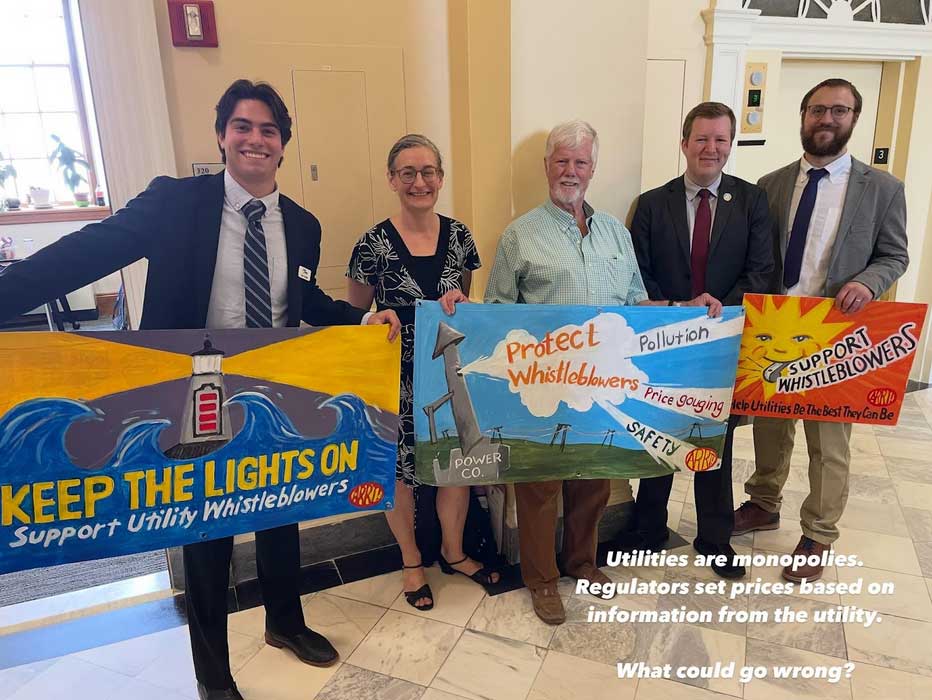First-in-Nation Utility Whistleblower Bill
How Did Your Legislators Vote?
Sponsored by Senator Michael Tipping (D) and co-sponsored by legislators from both parties, LD 1963 proposed to empower the Maine Public Utilities Commission to offer financial rewards to individuals who expose wrongdoing within public utilities. The measure mirrored federal whistleblower programs, notably Dodd‑Frank’s SEC model, with provisions to protect confidentiality, provide for investigation, and compensate whistleblowers based on the significance of their information.

In testimony before the Energy, Utilities and Technology Committee, Our Power’s Executive Director Seth Berry highlighted that self-regulation by utilities is insufficient and pointed to federal models that have successfully deterred misconduct in other sectors. He emphasized that having an external channel for accountability could prevent imprudent investments or regulatory violations that harm consumers .
How did your Legislator Vote on Maine’s First-in-Nation Whistleblower Proposal?
Your Representative and Senator each had two chances to vote on L.D. 1963. For the first three roll calls listed below, a vote of YES was in favor of the bill. For the fourth roll call below, the June 18 Senate vote, a vote of NO was in favor of the bill. Click the links below to see how your legislator voted!
Not sure who represents you? Visit our new Citizen Action Guide to find out!!
LD 1963 passed the Senate on June 16 with a 20–14 vote, signaling cross-party support. However, in the House on June 17–18, the bill took a sharp turn as members rejected the committee’s “ought to pass” recommendation in a 68-78 vote, and instead adopted the “ought not to pass” report. A motion to reconcile failed, and on June 18, the House officially placed the bill into the legislative files, ending its ambitions this session.
Utilities wield significant power over essential services, energy, water, and telecommunications. Without external oversight, there’s little to deter corporate malfeasance or imprudent investments that are ultimately paid for by consumers. Insiders, from engineers to analysts, may witness financial missteps or misconduct but often hesitate to report due to fear of retaliation.
A whistleblower protection and reward system, modeled after proven federal laws, could change that dynamic—encouraging disclosures that benefit both the public and regulators. Our Power made the case that Maine deserves a system as robust as the SEC’s: anonymous reporting, defined rewards tied to recoveries, and procedural safeguards.
Though LD 1963 stalled this session, its objectives are more important than ever. As energy systems evolve, through renewable integration, grid modernization, and climate adaptation, the stakes are high. New, first-in-nation bills often take more than one try. Our Power intends to regroup in the next legislative cycle, building broader coalitions and addressing legislators’ concerns to advance this vital reform.
We believe this isn’t just about punishing wrongdoing, it’s about preventing it. A state-level utility whistleblower protection law would strengthen oversight, empower insiders to speak up, and ensure utilities remain accountable to ratepayers.
Our Power’s advocacy for LD 1963 marked a significant push toward accountability and transparency in Maine’s utility sector. While the bill didn’t pass, it generated momentum and public awareness, and may well set the stage for future reforms. For media inquiries, community discussions, or to join the campaign, contact Our Power and stay tuned as this issue returns to the legislature.
